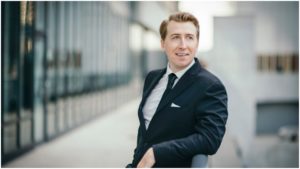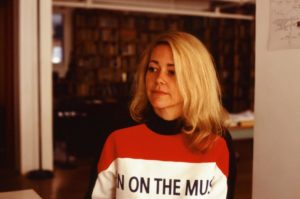
Q & A: Tenor Joshua Dennis On Huang Ruo, Poul Ruders, & Realizing the Life-Changing Effects of Positive Affirmations
By Jennifer Pyron(Photo credit: Simon Pauly)
Today tenor Joshua Dennis is on a roll.
A look back at his 2018-19 season reveals a whopping seven productions across such U.S. cities as New Orleans, San Antonio, Salt Lake City, Saint Paul, and Santa Fe in repertory ranging from classic romantics such as Verdi and Gounod to world premieres with modern masters like Joel Puckett and Poul Ruders.
And the 2019-20 season is set to be full of even more impressive projects, including “Riders of the Purple Sage” in Arizona Opera and “M. Butterfly” in Santa Fe.
The tenor recently spoke to OperaWire about his experience working on world premieres of Ruder’s “The Thirteenth Child” and Puckett’s “The Fix.”
OperaWire: How it was to debut the role of “Shoeless” Joe Jackson at the Minnesota Opera’s world premiere of Joel Puckett’s “The Fix.” What was it like to play such a big role in the creation of this character’s music?
Joshua Dennis: That was a pretty neat experience. Minnesota Opera has always been very kind to me. They gave me my first experience as Romeo, and my first experience as Duca in “Rigoletto.” The General Director hired me for a world premiere in Arizona. They have been very kind to me.
When I got the call about the role of “Shoeless” Joe, I thought yes, absolutely! I grew up loving baseball. My extended family members are baseball players. So I was thrilled. And as soon as I got to the first workshop, Joel Puckett who writes beautiful music, said, “Okay, I get your voice now and I know how to write the rest of the opera for it.”
And he did. And everything fit really well and it was a nice collaborative process where if something was a little too high or something was hard, I felt free to say what I could. It felt very personalized, which you don’t get with Mozart or anything like that. And it makes you wonder what those first artists felt when singing through “The Magic Flute” for the first time and how they experienced the first time for their roles.
OW: How did you prepare for the role and relate to “Shoeless” Joe?
JD: I did a lot of research on the character and it was nice that this character was a real person that was documented. So even if there were some liberties taken in the story, I could see who he was, where he came from, pictures of the old mill house and how poor everyone was back then. Second hand accounts, first hand accounts. I
t was easy to connect to him. And I was raised poor, so was “Shoeless” Joe, and this helped me understand how money played such a big role in his life and why certain decisions were made based on money. That was the big crux of the whole show: people trying to make a living but it being underpaying and undervalued.
He also had the added curse of being uneducated. He could not read or write. So I think I had to use my skills as an actor to dig back into my own experiences to make something truthful. And I think a lot of artists understand that when we are starting out, the length that we will go to in order to make that check or make that rent is real.
He also had a loving wife who supported him no matter what and with that relationship it’s easy to go back to my wife and think how I would act or talk with her about difficult things. So, because it’s a real story, as an actor you get to dive into your own life and re-evaluate how you’ve handled things or how you would handle things and put that into the show to create a believable character.
OW: Tell us about being at Santa Fe Opera (SFO) and singing the role of Frederic in the world premiere of “The Thirteenth Child.”
JD: I think one of the things about this season is learning how a world premiere can be a hit or miss. You try your hardest. You love the piece as hard as you can.
And with “The Thirteenth Child” the cast ended up having a great time despite the hit or miss aspects. The production team and cast were amazing. One of my all time favorite experiences was working with the creatives.
Our costume designer, Rita Ryack, is so talented and created one of my favorite costumes of all time. Darko Tresnjak, a Tony Award winning director, was a dream come true to work with. And our conductor, Paul Daniel’s insight was profound. So really for me the best part of this whole process has been working with some of the most talented people in the whole world and seeing their creation come to life.
My role as Frederic wasn’t a title role, so I was able to sit back and watch everybody else work. And this was unusual for me because I am used to more engrossing roles while on stage, but something not as self-indulgent allowed me to kick back and watch the pros go to work.
OW: What was your main take away while performing the role of Frederic, Prince of Hauven?
JD: Realizing that if it is art, you don’t have to love it. However, you can choose how you feel about it and maybe this was the biggest thing for me in this role. It wasn’t tough, it wasn’t Puccini. It wasn’t a piece that you could sit there and feel like “oh my god this is what I do this for.”
I mean there are certain brilliant moments that I love listening to like how David Leigh, who sang the role of Hjarne the King of Frohagord, has this beautiful moment in the beginning. And the Gertrude the Queen of Frohagord, sang by Tamara Mumford, and Lyra the Princess of Frohagord, sang by Jessica E. Jones have beautiful moments of singing.
But to be able to understand that it’s music that you don’t quite understand and don’t quite feel was something new for me. A lot of the falsetto moments were hard and unusual, so we stayed enthusiastic about it together and worked to really make it truthful. Even if you felt uncomfortable or that the music was hard and modern, we tried to make it as truthful as possible. And to share this experience with everybody was what bonded us together most.
OW: What do the falsettos in “The Thirteenth Child” signify?
JD: I think they signify madness in the King of Frohagord and the horrible things that you certainly wouldn’t want to do or experience. You hear the falsettos most from the King and from Drokan, Regent of the Kingdom of Hauven.
But I don’t know. It could be a different technique that is used more frequently outside of the U.S.. Again, I think it’s most important to do the job and deliver a truthful performance. Luckily it is one of those moments that you know the audience is aware that the composer wrote the falsetto instead of the singer making that choice.
You don’t feel embarrassed at all about it in that way. And you just have to tell yourself, “Okay yes these are the right notes. This is what was written. And this is my job to sing it.”
OW: What excites you most about SFO’s 2020 season? Tell us about Huang Ruo’s “M. Butterfly” and his musical style.
JD: My role as Marc is a smaller role and I think the great thing about this is that it will actually give me time to enjoy a nice summer with me and my wife’s first child that is on the way. We will be babysitting the whole summer. And enjoying our time together.
But speaking overall in regards to Ruo’s music and work that I have performed, I am excited for this world premiere. I am actually leaving tomorrow for China because I will be performing Ruo’s “Paradise Interrupted” at the MGM Macau. It is a piece that my identical twin brother debuted at the Spoleto Festival. However, since he is festing in Dresden right now, I get to go to China and I’m excited! I feel like I’m the most versed Huang Ruo singer.
Despite my brother making the “Paradise Interrupted” debut, I’ve done three of Ruo’s operas. And he wrote a beautiful duet in “Paradise Interrupted” that merges 600-year-old Kun opera with contemporary Western opera. And the lead female singer, Qian Yi, is one of the greatest Kun singers in the world. Mixing Western and Eastern genres together is probably the most unusual musical experience that I have had. But I have a beautiful duet with Yi in scene four and although it is nonsense syllables for several measures with no patterns or rhyme or reason, I love it! It is the most difficult pattern that I have ever memorized.
And when Ruo was explaining about the passage he told us not to worry about it. However, us four singers were singing in unison, so if one of us messed up it would be totally noticeable. Visually it is stunning though, especially with the work of visual artist Jennifer Wen Ma.
OW: I was reading on your website about your new practice with positive affirmations. Can you tell us more about what this means and how it works for you?
JD: It’s so interesting to me. You know this idea of talking to yourself sounds crazy, but we all actually all talk to ourselves whether or not we want to admit it. But for me I’ve had to use it, for example to overcome a constant tendency I have to create tension at the base of my tongue which affects my high notes.
I tell myself something constructive that is happening in my body like, “I always sing open and freely.” Because when you miss a high note, how many times do you catch yourself saying something mean to yourself for missing it? Imagine if you replaced what you told yourself with something constructive and positive. I even use them when I travel to ease my anxiety.
I mean this is a business that is ever changing and so making constructive affirmations that you can believe in and build upon is life changing. And I’ll be the first to admit that I’m still new to this and I started last summer by saying “I’m going to walk out on this stage and sing an open and free B.” And every time I say this, I do.
You can learn more about Joshua Dennis and his positive affirmations by visiting his website:




